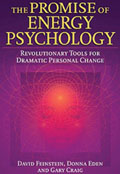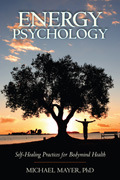Psychotherapy using Energy Psychology
 As Dr. David Feinstein summarizes his highly effective approach to energy psychology in Rapid Treatment of PTSD: Why Psychological Exposure with Acupoint Tapping May Be Effective, "Combining brief psychological exposure with the manual stimulation of acupuncture points (acupoints) in the treatment of post-traumatic stress disorder (PTSD) and other emotional conditions is an intervention strategy that integrates established clinical principles with methods derived from healing traditions of Eastern cultures." Dr. Feinstein has written a number of introductory articles on energy psychology which include an overview of the field, case studies, brief history, how it changes gene expression, concepts and procedures, an explanation of the scientific basis of Energy Psychology and how it has been found effective for PTSD, Depression, Anxiety, and other Psychological Symptoms, and more.
As Dr. David Feinstein summarizes his highly effective approach to energy psychology in Rapid Treatment of PTSD: Why Psychological Exposure with Acupoint Tapping May Be Effective, "Combining brief psychological exposure with the manual stimulation of acupuncture points (acupoints) in the treatment of post-traumatic stress disorder (PTSD) and other emotional conditions is an intervention strategy that integrates established clinical principles with methods derived from healing traditions of Eastern cultures." Dr. Feinstein has written a number of introductory articles on energy psychology which include an overview of the field, case studies, brief history, how it changes gene expression, concepts and procedures, an explanation of the scientific basis of Energy Psychology and how it has been found effective for PTSD, Depression, Anxiety, and other Psychological Symptoms, and more.



